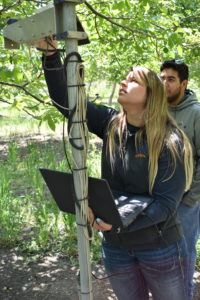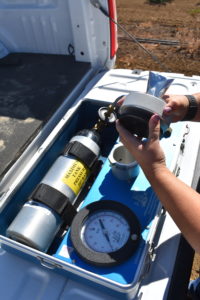Growing Together Summer 2022
Changing Techniques to Address the Battle for Water
As the landscape of California has changed over the years, one topic remains at the forefront of every grower’s mind: water. Grow West is developing partnerships to provide innovative, evolving solutions to the omnipresent problem.
Prior to the recent five-year drought (2012-2016), water supply allocations were not as concerning for agricultural contractors in areas north and south of the Delta. By 2014, this changed significantly. A drought state of emergency would be declared as well as the passage of the Sustainable Groundwater Management Act (SGMA) in 2014. SGMA would establish a framework to protect groundwater resources for the long-term, placing importance on recharging basins. However, what the act didn’t foresee is the return of widespread drought conditions, a significant decrease in runoff since the 2017 water year and no rain on the horizon in 2022.
The domino effect water has presented to all residents in California is substantial. However, the changing water landscape also brings opportunity to evolve and innovate for a better tomorrow. Grow West PCA Nathan Azevedo recognized an opportunity to address water challenges by changing the perspective of water management for crops. A Maxwell native and fourth generation farmer, Azevedo was privy to the impact water allocations placed on rice growers in his community. “Three or four years ago, we had plenty of surface water and the irrigation district was lenient on how much you could use. Now, they’re checking meters and charging exactly what you use,” said Azevedo.
Azevedo watched as agricultural technology companies from Silicon Valley began to extend their irrigation management offerings to his neighbors. “These companies would initially set you up with water management tools, but if you required further assistance or had technical issues, you were on your own,” he said. The lack of service support and water would lead to the inception of Azevedo’s company, WaterLabs, an irrigation consulting business providing management recommendations for a variety of crops based on real-time data from the field and backed by University of California research. His goal: provide an integrated water management program focused on the long term.
Maximize ROI through an arsenal of water management tools

As Azevedo began to explore water management tools, he realized an integrated approach would be required to yield accurate data and provide the most return on investment for the grower. “Water is king, it’s everything. For example, if you stress your trees, it impacts nut size, growth, nut fill and your fertilizer applications,” said Azevedo. “On the other hand, too much water can create a higher disease environment and increase pest pressures.”
Water requires balance, which makes the integrated approach necessary to maintain stability in farming decisions. This balance includes using the right amount of water at the right time and understanding how your irrigation system applies water.
There are several tools within the water management space to determine when to apply water and how much. Two of the tools that WaterLabs incorporates into their management programs are soil moisture probes and pressure bombs. Soil moisture probes provide measurements of moisture at varying depths in the soil. Data pulled from the probe shows when the irrigation system is turned on/off and where water infiltration has occurred. The probes present a precise indication of how much moisture is in the root zone. Pressure bombing can also help determine and monitor crop stress. Essentially, the device is a ‘blood pressure test’ for tree leaves. Testing a leaf in the pressure chamber will show how much water the tree is pulling from the soil and provides a baseline for creating an irrigation schedule tailored to each block. By calibrating soil moisture probes to pressure bomb readings, you can estimate when and how long irrigation is needed to prevent or encourage crop stress (specifically during hull split).
WaterLabs combines the data sets from these tools into a summary report growers can easily understand. Grow West PCA Rachael Wilson utilizes the reports to consult customers on irrigation schedules and crop stress. In reviewing the summary reports, she has witnessed growers change their perspective around water management, “Most growers are over or under irrigating and don’t realize it until they see the data from these tools. Utilizing water management tools has helped some of our customers see 20-40 percent water savings. That’s money back in their pocket that can be rerouted to other farming inputs.” Growers can utilize summary reports to show their water usage and initiative in managing water in the face of SGMA and other regulations.

A dynamic year requires a change in perspective
In a growing season impacted by early frost events, reduced water allocations and inflation, Wilson is working with growers to modify their water management programs to meet stringent crop needs and budgets. With lighter crop loads in almond orchards, growers may be stressing their trees more than usual before harvest. Wilson is there to help monitor this stress and ensure the trees remain fruitful for the following season. She explains to address these changes it’s important to remain open-minded and be flexible. Having discussions around the investment and long-term benefits of water management is part of this.
“Change is hard. We all like to live in our comfort zone of how things have always been done in the past, we eyeballed what our water usage was. Now, we have the option to incorporate new water management strategies to apply water more efficiently,” said Wilson. Water management doesn’t just consider water usage, it also examines crop health and orchard/vineyard longevity. The full scope of water management must evolve to include an understanding of water quality.
WaterLabs partners with Apollo Ag Technologies to prioritize water quality with customers. This year, several growers within the Sacramento Valley are using groundwater to irrigate for the first time and its water quality is typically poor when compared to surface water. Water quality can directly impact distribution uniformity (DU), soil quality and fertilizer applications. For example, 90 percent of nitrogen uptake is through water. If your water quality is poor and you’re not irrigating correctly, your fertilizer application efficiency is significantly reduced.
Steven Perry, Grow West PCA, reiterates the importance of water quality with his customers. “We often irrigate too much or too little before realizing our water quality is what’s impacting soil penetration. Just because we have moisture doesn’t mean it’s necessarily available to the plant. Water quality determines the usefulness of our field inputs.”
In their partnership with Apollo, WaterLabs can offer DU testing, irrigation system flushing and line clean out options to growers. The Grow West team is also available to take water samples to diagnose and address water quality issues.
Adapting to change by evolving as your growing partner
The water challenges in California are not going anywhere any time soon. But with an innovative team on your side, addressing the changing landscape can be easier. To be a better partner for growers, Grow West acquired WaterLabs in 2021 to grow and evolve current water management strategies and strive for continued improvement.
“Water management is like a puzzle,” Azevedo said. “You can’t see the complete picture without taking into consideration irrigation technologies, scheduling, water quality and crop nutrition. If we can help our growers address these changes and ease into an integrated approach, it’s a win for both of us long-term.”
The Grow West team is committed to providing the full service of WaterLabs. Therefore, we will continue to look for new innovations that improve irrigation efficiency while providing ease of use for growers. As WaterLabs has been integrated into Grow West’s services, the PCA team has shown interest in the capabilities water management offers. “With the changes in water impacting crop production and health, it’s caused a lot of people in the business to reassess how they irrigate,” said Perry. “PCAs are working closely with Rachael and myself to make adjustments to their growers’ water management programs.”
Grow West’s service area is unique. As such, the approach taken focuses on service and detail. Our team of experts will continue to target your specific crop needs through these changes so we can evolve and adapt, together.
